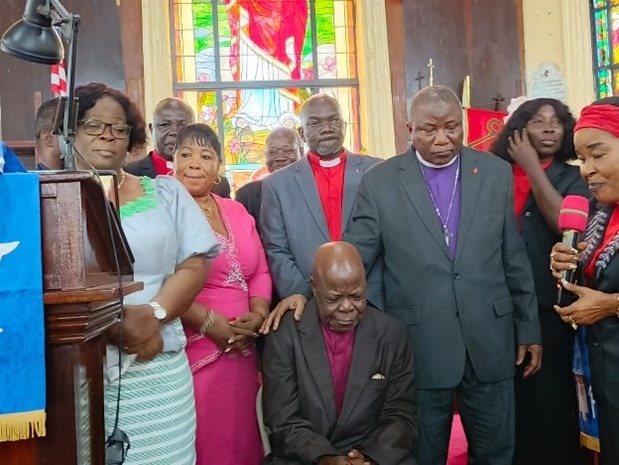In a remarkable turn of events within the United Methodist Church (UMC) in Liberia, retired Bishop Arthur F. Kulah has issued a profound and heartfelt apology for his past actions, particularly those directed towards incumbent Bishop Samuel Jerome Quire, Jr. and his wife. Bishop Kulah, a long-serving pastor and advocate for peace and reconciliation, acknowledged the pain and division his actions had caused within the church, expressing deep remorse and appealing for forgiveness. His plea for understanding and reconciliation resonated strongly, emphasizing the importance of grace and forgiveness in mending fractured relationships within the Christian community. He poignantly stated, “I am truly sorry for my mistakes, and I ask for your forgiveness. I hope we can move forward in love and cooperation, as we have always been a family bound by faith.” This statement reflects a significant shift in his prior public stance, which was markedly critical of Bishop Quire’s leadership.
The crux of the controversy stems from previous public statements made by Bishop Kulah where he sharply criticized Bishop Quire’s leadership, labeling him the “worst Bishop in the history of the Church,” a “dictator,” and someone who refused counsel. These remarks ignited considerable debate and mixed reactions within the UMC. While some condemned his words as divisive and harmful to the church’s unity, others supported his criticism, potentially viewing it as a necessary challenge to the existing leadership. This public denouncement created a rift within the church and undoubtedly strained the relationship between the two bishops. Bishop Kulah’s subsequent apology, therefore, signifies a substantial personal transformation and a commitment to healing the divisions he had sown.
Bishop Kulah’s appeal for forgiveness comes at a crucial juncture for the UMC, a period marked by significant changes and a renewed focus on rebuilding trust and fostering stronger bonds among its members. His willingness to publicly acknowledge his errors and seek reconciliation has been widely praised both within the church and the broader Liberian community. Many view his actions as a courageous demonstration of the core Christian tenets of repentance and forgiveness, setting a powerful example for others. His apology has been met with acceptance from Bishop Quire, who expressed forgiveness and welcomed Kulah back into the fold of the UMC. This reciprocal gesture of forgiveness holds the promise of healing the rift and fostering a more unified church.
The acceptance of Bishop Kulah’s apology by Bishop Quire marks a significant step toward reconciliation. Bishop Quire’s statement, “We have forgiven you and we are glad that you are back with the United Methodist Church through this time and struggle,” demonstrates a commitment to moving past the conflict and focusing on the shared faith and mission of the church. This reciprocal act of forgiveness sets a potent example of Christian grace in action and reinforces the importance of unity within the church body. This incident underscores the power of forgiveness in overcoming conflict and promoting healing within a community.
The broader implications of this reconciliation extend beyond the personal relationship between the two bishops. Bishop Kulah’s public apology and Bishop Quire’s acceptance of it serves as a powerful testament to the transformative power of forgiveness. It provides a hopeful model for conflict resolution within the UMC, particularly during a time of significant change and internal challenges. By acknowledging past mistakes and seeking forgiveness, Bishop Kulah has created an opportunity for healing and renewal within the church. His actions may inspire others to address conflicts constructively and prioritize unity and understanding. This event could potentially serve as a catalyst for positive change and growth within the UMC, strengthening its foundation and enabling it to better serve its community.
The story of Bishop Kulah’s apology and its acceptance by Bishop Quire resonates with the core values of the Christian faith and offers a valuable lesson in the power of forgiveness and reconciliation. This event holds the potential to inspire positive change within the UMC and the wider community, demonstrating how acknowledging past mistakes and seeking forgiveness can pave the way for healing and a more unified future. It underscores the importance of grace and forgiveness as essential elements in fostering stronger relationships and building a more harmonious and compassionate society. The willingness of both bishops to embrace forgiveness offers a powerful example of how even deep divisions can be overcome through humility, repentance, and a commitment to shared faith and purpose.


